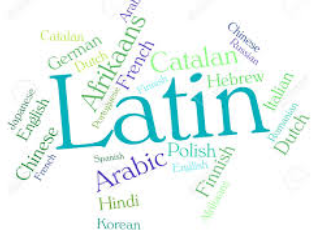Books and Arts
来源于《图书和艺术》版块
Johnson
《约翰逊》语言专栏
The Roman way
罗马精神
Latin is dead—yet, as Italian (and French, and Spanish), it lives on
拉丁语已经消亡了,但是,它仍然以意大利语(法语和西班牙语)的形式存在
Cicero, the Roman statesman whose prose is thought to represent the peak of style in Latin, was also a bit of a snob about it. Few others, he complained in a tome written in 46bc, used the language properly any more. His gripes would be worse today. At a recent mass at the Vatican attended by your columnist, some of the Latin used by Pope Francis was impeccable. But much of it was downright dismal; it would have been incomprehensible to Cicero. Strangely, the pope’s remarks were translated into several other species of terrible Latin.
西塞罗是罗马政治家,其散文被认为时拉丁语风格顶峰的代表,他本人对此也有点自命不凡。他在一部写于公元前46年的大部头著作中抱怨说,很少有人再正确地使用这种语言了。要是今天他可能抱怨更多。在本专栏作家最近在梵蒂冈参加的一次弥撒上,方济各教皇使用的一些拉丁语是无懈可陈的。但大部分情况下拉丁语的使用不尽人意;这对西塞罗来说是无法理解的。奇怪的是,教皇的话被翻译成其他几种糟糕的拉丁语。
That is because the pope’s dismal Latin is also known as “Italian”. Francis’s native language, Spanish, is another kind of deformed Latin. The French in which his interpreter greeted some of the faithful is yet another variety.
这是因为教皇所讲的没落的拉丁语也被称为“意大利语”。弗朗西斯的母语西班牙语是另一种变形的拉丁语。他的翻译问候一些忠实的信徒时使用的法语,这是另一种变体。
Family trees of languages typically show Spanish, French and Italian descending from Latin in the same way that you are descended from your mother. But this is misleading. There was no birth of Italian, nor any definitive death of Latin. Instead, there were centuries of infinitesimal changes. Those who noticed them would, like Cicero, have considered them mistakes. But most people didn’t care, which is how such tweaks took hold, and spread. As they accumulated, Latin did not create Italian and its sister languages. It became them.
语言的家谱通常显示,西班牙语、法语和意大利语是从拉丁语演变而来的,如同你是你母亲的后裔一样。但这是一种误导。没有意大利语的诞生,也没有确切的拉丁语的消亡。然而,却经历了几个世纪的微小变化。那些注意到它们的人,会像西塞罗一样,认为它们是错误的。但大多数人并不在意,这就是这种调整是如何生根发芽并传播开来的。随着变化的累积,并不是拉丁语创造了意大利语和姊妹语言。而是演变成了这些语言。

Throughout the Dark Ages, the few literate Europeans continued to write in classical Latin. Or they tried to: as their speech evolved, their writing sometimes mutated to match it. A list of commonly misspelled words, written in the third or fourth century, offers a glimpse of what was happening. For example, the list insists on calida (hot) not calda: the unstressed “i” was evidently disappearing. (Now it is calda in Italian.) Other sounds were changing, too. Use frigida not fricda, the list advises. The word for “cold” was on its way to today’s fredda.
在整个黑暗时代,少数精通文学的欧洲人继续用古典拉丁语写作。随着语言不断进化,其他人有时试图让写作发生相应的变化。一份写于三、四世纪的常见拼写错误的单词列表,能让我们一窥当时发生了什么。例如,这个列表坚持使用“calida”(意为“热的”)而不是“calda”:不重读的“i”显然正在消失。(现在意大利语是“calda”。) 其他读音也在变化。那个列表建议使用“frigida”而不是“fricda”。这个词意为“冷的”,现在写作“fredda”。
Nor was pronunciation the only moving part. Modern students of Latin often wrestle despondently with the language’s case system, in which the role a noun plays in a sentence is signalled by alternative endings. These collapsed into fewer forms in the Dark Ages; in modern Italian they leave no trace. Meanwhile, Latin’s three genders (masculine, neuter and feminine) merged into two. Words were substituted. People stopped using Latin’s loqui, “to speak”, and started using parabolare, which originally had a narrower meaning. It became Italian’s parlare.
发音并不是唯一改变的部分。现代拉丁语学生常常沮丧地与这种语言的大小写系统作斗争,在这种系统中,名词在句子中所起的作用由不同的结尾来表示。这些在黑暗时代坍塌成更少的形态;在现代意大利语中,它们没有留下任何痕迹。与此同时,拉丁语的三种性别(阳性、中性和阴性)合并为两种。很多词有了替代。人们不再使用拉丁语的“loqui” (意为“说话”),而是开始使用“parabolare”,这个词最初的意思比较少。现在这个词的意大利语是“parlare”。
A millennium or so after Cicero’s moans, in other words, Europeans spoke a range of tongues that were nevertheless related to each other and to Latin. What happened next in Italy had as much to do with politics as with the dynamics of languages. The contrast with its northern neighbour is instructive. France was unified by the conquest of territory spreading out from Paris; the conquerors brought Parisian speech with them, and that became “French”. A mighty state then did its best to teach that language everywhere, and to eradicate local variants.
换句话说,在西塞罗抱怨之后的一千年左右,欧洲人说着各种各样的语言,尽管这些语言彼此关联,也与拉丁语有关。接下来在意大利发生的事情,不仅与语言的活力有关,也与政治有关。与北方邻国的对比很能说明问题。法国通过征服从巴黎向外扩张的领土而统一;征服者带来了巴黎语,并成为“法语”。当时,这个强大的国家竭尽全力在各地 教授这种语言,并根除当地的变体。
Italy was unified far later, in the 19th century. “Italian” was thus created by the pen, not the sword. The 13th- and 14thcentury works of Dante, Petrarch and Boccaccio were the peninsula’s most revered literature. So when, in the 16th century, Pietro Bembo sat down to write a grammar for the prestige language of their texts, he used their (by now rather old) Tuscan dialect as his model. In this way “Italian” was born—though Bembo titled his book simply “Writings on the Vulgar Tongue”. It soon spread to elites in other regions.
意大利很晚才在19世纪统一。因此,“意大利语”是由笔而不是剑创造的。13、14世纪但丁、彼特拉克和薄伽丘的作品是半岛上最受尊敬的文学作品。因此,16世纪,当皮埃特罗·本博坐下来为他们的经典语言编写语法时,使用了他们的托斯卡纳方言(到目前为止相当古老)作为模型。就这样,“意大利语”诞生了——尽管本博把他的书简单地命名为“俗语的写作”。它很快就传播到了其他地区的精英阶层。
Even then, ordinary folk continued speaking their own dialects, which, across great enough distances—say from Milan to Naples—were and remain mutually incomprehensible. These are not bad copies of Italian but its siblings, descendants of Latin in their own right. Over half of Italians proudly speak one of them still (though nearly all speak Italian, too). A Sicilian who doesn’t speak Sicilian is hardly worthy of the name; Neapolitan plays a crucial role in the celebrated novels of Elena Ferrante.
即使在那个时候,普通百姓仍然在讲他们自己的方言,这些方言跨越了足够远的距离,比如从米兰到纳普勒斯,彼此之间仍然无法理解。这些并非意大利语失败的复制品,而是其兄弟姐妹,拉丁语的后裔。超过一半的意大利人仍然自豪地说其中一种语言(尽管几乎所有人也都说意大利语)。一个不会说西西里语的西西里人很难称得上是西西里人; 那不勒斯人在埃琳娜·费朗特的著名小说中起着至关重要的作用。
These days, amid migration and globalisation, Italian continues to develop. Naturally some worry that it is happening too fast; that young people are derelict in their grammar, or use too many foreign words. In reality, the same forces that made Latin from its predecessor (called Proto Indo-European), and turned Latin into Italian—the drift of time and exposure to different influences— are still operating. The only unchanging language is an unspoken one. Classical Latin may be dead—but as Italian, it lives on. Long live dismal Latin!
如今,在移民和全球化的背景下,意大利继续发展。自然有人担心这一切发生得太快;年轻人在语法上荒废了,还使用了太多的外来词。事实上,时间累积和受到的不同影响使拉丁语从前身原始印欧语变为拉丁语,而同样力量也把拉丁语变成意大利语,如今这种力量仍然在发挥作用。只要语言在使用就会一直发生改变。古典拉丁语可能已经绝迹,但作为意大利语,它仍然存在。没落的拉丁语万岁!
来源:经济学人

参与评论